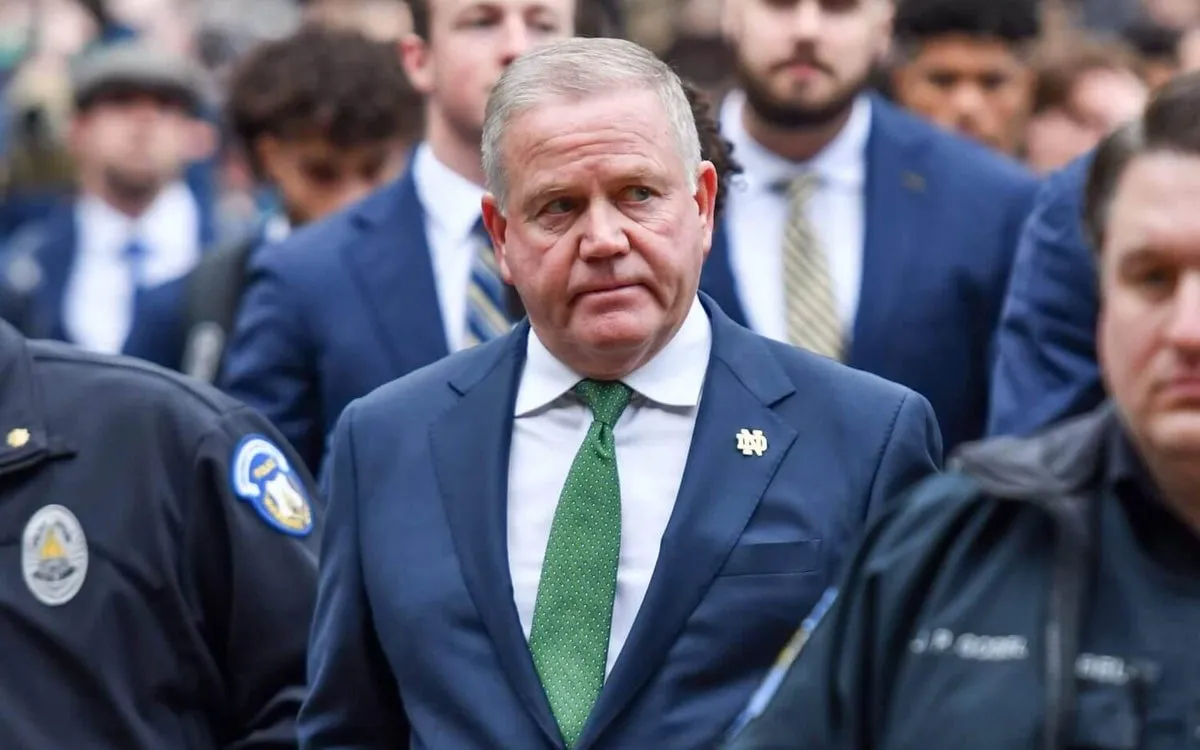
SOUTH BEND, Ind. — Stepping into the Notre Dame football practice facility, the presence of former Irish head coach Brian Kelly is felt but not seen. To the left of the entrance doors, a list displays the names of over two dozen generous donors who financed a significant project, completed in 2019, which Kelly insisted be constructed. Among these benefactors was Kelly himself, leaving behind what can be viewed as a parting gift from the school’s all-time winningest coach.
However, on Sunday night, Kelly contributed something even more significant to Notre Dame. As you may know, LSU recently terminated Kelly’s contract following a dismal home defeat against Texas A&M. The atmosphere at Tiger Stadium turned hostile, with fans chanting for the head coach's dismissal. The situation grew increasingly volatile, reflecting a fan base that was both apathetic and toxic, despite the contradictory nature of those sentiments.
Throughout his coaching career, Kelly has shown indifference to public perception, whether as a hero or a villain. Yet, being the subject of ridicule is not sustainable for any coach, and college football fans reveled in the sideline footage capturing Kelly's visible distress. It would be easy to suggest that the joke is now on Kelly, but both Notre Dame and LSU have made him a wealthy man. Should LSU opt to pay Kelly's entire buyout, rather than negotiate a lower sum, the total could exceed $50 million. This hefty price tag reflects LSU's desire to part ways with Kelly after a season that shifted from aspirations of a national championship to wondering whether he would participate in outrageous bowl season antics like a mayonnaise bath.
Kelly's dismissal from Baton Rouge signals the end of a tumultuous chapter between him and Notre Dame, following his controversial exit in December 2021. At that time, he left for the SEC while the Irish were still vying for a spot in the four-team College Football Playoff. Ultimately, Notre Dame finished just one position shy of making the cut, leading to the promotion of Marcus Freeman as head coach in hopes of revitalizing the program. However, this transition marked a significant crisis for Notre Dame, although few were willing to acknowledge it openly.
If Kelly had achieved a championship at LSU, it would have raised serious questions about Notre Dame's program. It might have suggested that the small Catholic institution in northern Indiana was out of touch with modern college football dynamics, including name, image, and likeness (NIL) deals and the transfer portal. Historically, Notre Dame's glory days were characterized by legendary figures like Knute Rockne and Frank Leahy, but Kelly's move highlighted a potential bleak future for the Irish.
Despite the humor and memes surrounding Kelly's coaching antics—such as his animated reactions after losses to USC or his complaints about media coverage—these moments were merely superficial distractions from the underlying issues that haunted Notre Dame, even after reaching the national championship game last year. The laughter may have been entertaining, but it masked a deeper concern: what if Kelly succeeded at LSU?
With Kelly's departure, it feels as though Notre Dame has exhaled a collective sigh of relief. Kelly faced numerous losses—both in games and in public perception. He lost his reputation as a coach who rarely faced termination, a distinction he often referenced during his tenure. More importantly, he lost the debate regarding his decision to leave Notre Dame for a new beginning in Baton Rouge.
In a parallel universe, there was a scenario where Kelly could have chosen to stay at Notre Dame, opting to enjoy a peaceful retirement in South Bend rather than navigating the pressures of LSU. Instead, his decision to leave compelled Notre Dame to take a chance on Freeman, a move that could define the future of the football program.
Freeman, who was recruited by Kelly from Cincinnati, represents a new direction for Notre Dame football. Under his leadership, the Irish have already made strides, having participated in the College Football Playoff, with hopes of returning. Freeman has embraced the opportunity, building upon Kelly’s foundation while simultaneously upgrading the program's infrastructure and resources, including a new operations building set to open next year and an enhanced NIL budget.
Reflecting on the impact of Kelly’s decision to leave, Freeman stated, “Coach Kelly gave me an opportunity to come here, and I’m always rooting for him. But it’s also the profession we’ve chosen. We know that can be the result of choosing this profession.”
As of now, Brian Kelly has faced the consequences of his actions at LSU, and his legacy at Notre Dame is no longer an existential threat. Instead, he has become just another name on the wall, marking the end of an era and the dawn of a promising new chapter for Notre Dame football.